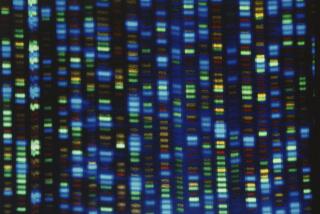How a Body Responds to Drugs Depends on the Genes
- Share via
WASHINGTON — The day may come soon when you will go to the drugstore to fill a prescription and hand the pharmacist a credit-card-size DNA “chip” containing your entire genetic profile. The druggist then will choose the right medicine for you based on your genes.
Filling prescriptions by genes may sound futuristic--but it is not. In a few instances, researchers already have identified specific genetic responses to certain medications and are using this knowledge to steer patients to alternative drugs.
Pharmaceutical companies have “gene tests” under development that would be prescribed with their new drugs when these compounds hit the market--sometime in the next two or three years--as well as similar tests for physicians to use before prescribing drugs already on pharmacists’ shelves. And researchers are racing to learn more about how genes affect drug response.
“The future is now,” says Dr. Raymond L. Woosley, chairman of the pharmacology department at Georgetown University, site of one of the few labs in the nation to which patients are referred when they fail to respond to certain drugs, such as painkillers. “People shouldn’t expect their gene cards immediately--but it won’t be long.”
One of the major outcomes of the recently announced first draft of the human genome almost certainly will be the ability to predict--based on genetics--who will respond to certain drugs and who is likely to suffer a toxic reaction to a particular drug.
Knowing more about genes and drug reactions could go a long way toward eliminating the more than 100,000 deaths that occur annually from properly prescribed medicines that cause unexpected side effects. By identifying who is likely to suffer these reactions, many deaths can be prevented.
Such knowledge also could ensure that current drugs, which do not work for everyone, are given only to those for whom they will be effective.
Ultimately, experts predict, new generations of drugs will be created that will be tailored to specific individual genetic traits.
“It may take a decade to pull it all together, but this will be one of the first real systematic attempts to apply genetics to medical practice,” says Rochelle Long, chief of the pharmacological and physiological sciences branch of the National Institute of General Medical Sciences of the National Institutes of Health. “With the genome, all of this will now speed up.”
Different Genes, Different Reactions
When someone takes a drug, it interacts in the body with many different proteins. Some proteins help medicines do their job by activating them. Others help the body get rid of the drug.
Genes provide instructions to manufacture all of these proteins. And small differences in genes are the reason a drug works in some people and not in others.
These differences also are the reason some people metabolize drugs faster than others--meaning that some individuals might require higher or lower dosages of the same drug to get the same effect--depending on their genes.
At the Georgetown lab, researchers have discovered an enzyme--a subset of a protein--that helps break down medicines in the body.
Too much of this enzyme, known as cytochrome P450 form 2D6, and the patient’s body will get rid of a drug too quickly, meaning that a higher dose of the drug is needed if it is to work. Too little of the substance and the drug will leave the body slowly, meaning that less drug is needed.
Interestingly, in the case of codeine drugs, this same enzyme behaves in a much different way: Instead of helping to rid the body of the drug, it is activated, turning the codeine into morphine. If someone does not have enough of this enzyme, codeine does not work and there is no pain relief.
Patients with such problems often are referred to Georgetown for evaluation, where a simple swab of cells from inside the cheek to obtain DNA will reveal whether the enzyme is present.
“The enzyme is missing in 7% of people,” Woosley says. “It makes a big difference in how you respond to many medications.”
At a research branch of Hoffmann-La Roche Inc., in Alameda, scientists are working with Affymetrix, a Santa Clara genomics company, to develop a commercial test kit for this enzyme that would put the Georgetown lab’s work in physicians’ offices. It would enable doctors to detect levels of the enzyme before writing prescriptions.
“A doctor would use it before prescribing a variety of drugs, including cardiovascular drugs, antidepressants and painkillers,” says John Sninsky, Roche’s vice president for discovery research.
The company hopes to ask the Food and Drug Administration for licensing within the next two years.
Initially, the practical application of this growing body of genetic and drug information probably would be gene tests to determine whether a drug would be safe and effective in patients. If someone “fails” a test, he or she would not be given that particular drug.
Roche researchers are also working on a genetic test for those suffering from rheumatoid arthritis--a progressive, crippling autoimmune disease--that would identify people who should avoid methotrexate, one of the most commonly prescribed drugs used to treat it, and opt for more aggressive therapy with stronger combinations of drugs instead.
“In a disease where time is important, people shouldn’t spend several years on a drug and find out it’s not working,” Sninsky says, adding that the test could be on the market within the next two or three years.
Eventually, however, experts expect gene tests to become outdated. Probably they will become secondary to the availability of many different versions of the same drug that will be tailored to a range of individual genetic responses.
“The age of one-size-fits-all drugs is rapidly coming to a close to be replaced with an era of designer drugs,” says bioethicist Art Caplan, director of the bioethics center at the University of Pennsylvania. “Soon, every drug will come in many variations and in doses targeted to biological groups.”
But, as with all medical breakthroughs, there may be a downside. The price of this new generation of targeted drugs almost certainly will be higher than universal drugs.
In addition, “there may be groups of people identified by their genes as so risky to do research on that no one will put them into studies,” Caplan says. “And some racial or ethnic groups may be far more responsive to drugs than others, leading to issues of stigma, even discrimination.”
But most scientists believe that the potential benefits far exceed these concerns. Instead of worrying about the costs of such new drugs, consider that “you could be saving a lot of money, as well as potential harm, from keeping the wrong persons from getting a drug,” Woosley says.
Long agrees, adding that she believes “appropriate policies will be developed” to protect privacy and that “nothing’s going to happen until it’s safe for people to have this information.”
Research Grants for Genome Studies
NIH recently awarded nine new research grants, totaling $12.8 million, for the first year so investigators can better understand how a person’s genetic makeup determines the way a medicine works, as well as what side effects are likely. Among them:
* UCLA researchers are studying the genetic response to two antidepressant drugs, a major area of concern because response of patients to antidepressants is extremely variable.
“For antidepressants, about 60% of people respond to any one of them, but there’s no way to know in advance which drug will work and in whom,” says Dr. Julio Licinio, director of UCLA’s clinical pharmacology program and professor of psychiatry, who is doing the study.
“I have to treat every day from four to six weeks to know if a drug will have an effect. If it doesn’t work, then I have to stop for a washout period of a week or two, then try again,” he adds. “It’s a very tedious process that can take up to a year or more. It’s a total waste to [prescribe] a drug that’s not going to work--and right now, it’s trial and error.”
* Dr. David A. Flockhart at Georgetown University Medical Center--in addition to his work with pain relief and metabolism of drugs--is studying the variable responses to the breast cancer drug tamoxifen.
* At the Mayo Foundation in Rochester, Minn., Dr. Richard M. Weinshilboum is studying another enzyme that works to eliminate cancer drugs from the body. “Some people have active forms of this enzyme, and others have very, very little clearance activity,” says Long, of the NIH.
“If you are someone going through cancer chemotherapy, if you have high levels, you will chew up that drug right away before it has a chance to act. For others, with low activity, if you get too much of a drug, you could die of fatal bone marrow suppression. This is one of the many factors explaining people’s reaction to chemotherapy. If you understand what metabolic pathways are working, you can predict how much drug to give them.”
* Researchers at Brigham and Women’s Hospital in Boston are studying the genetic influences involved in the response to the three main types of treatment for asthma.
* NIH also is funding the creation of a sophisticated computer databank at the Stanford University School of Medicine. Every bit of data generated by the research will be stored in this one system. Eventually, the information will be shared among researchers and physicians and put to practical use.
The hundreds of proteins produced by the body likely work through multiple pathways that interact with medications, which is a “very highly complex set of information,” Long says. “Trying to correlate it will be a massive undertaking.”
Nevertheless, she adds, “eventually it will have an important impact. And with all the genome information coming out right now, we think the timing is right.”






